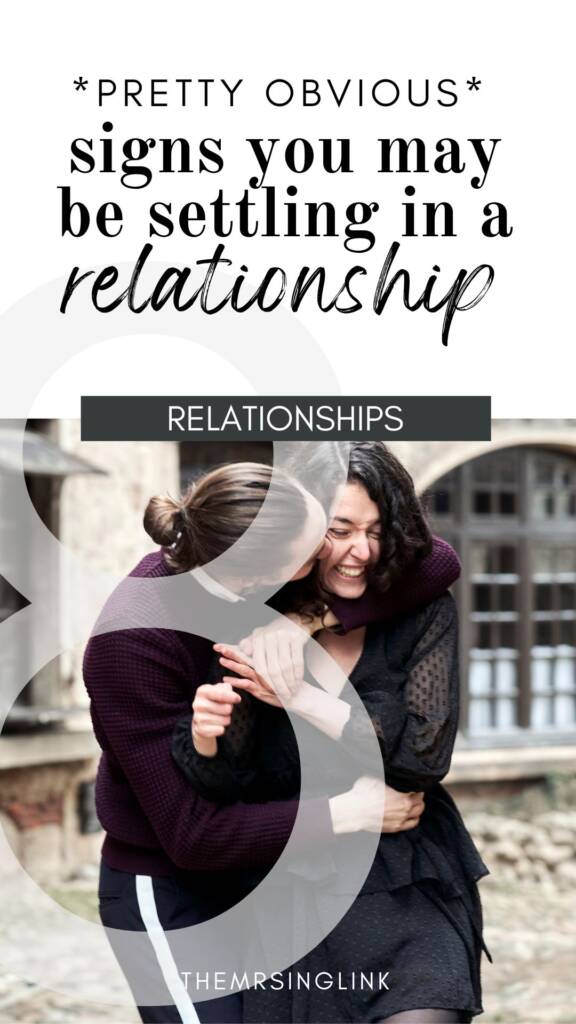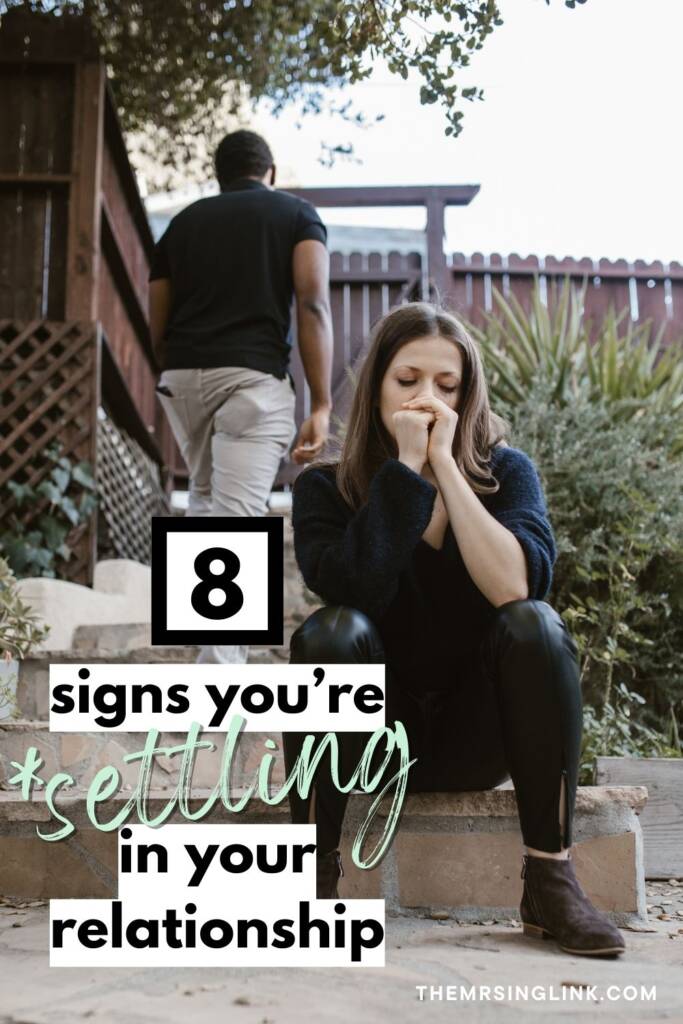After thinking long and hard on this, it really dawned on me how we’re all afraid to admit just how much we settle for things in life. I mean, on days we don’t feel like putting in the effort to cook, we settle for something to eat that’s quick and not always nutritious, right? And that just one of many examples.
Seriously, though, do we cover our eyes, point and say, “Aha, that’s it! That’s the one!” in terms of our relationships? No, no we don’t, and the reality shows like Married at First Sight don’t count – until the cameras stop rolling and show’s over, that’s not reality, my friends.
A great deal of thought and consideration goes into choosing a partner. But sometimes, the reality is…many may also be settling in a relationship, and this post dives into the signs according to someone who did. Yes, yours truly.
In part one of this two-part post, I share some of the more *obvious* but maybe not so obvious signs of settling in a relationship, based on my personal experience. Stay tuned for part two which dives into the trickier or often overlooked signs.
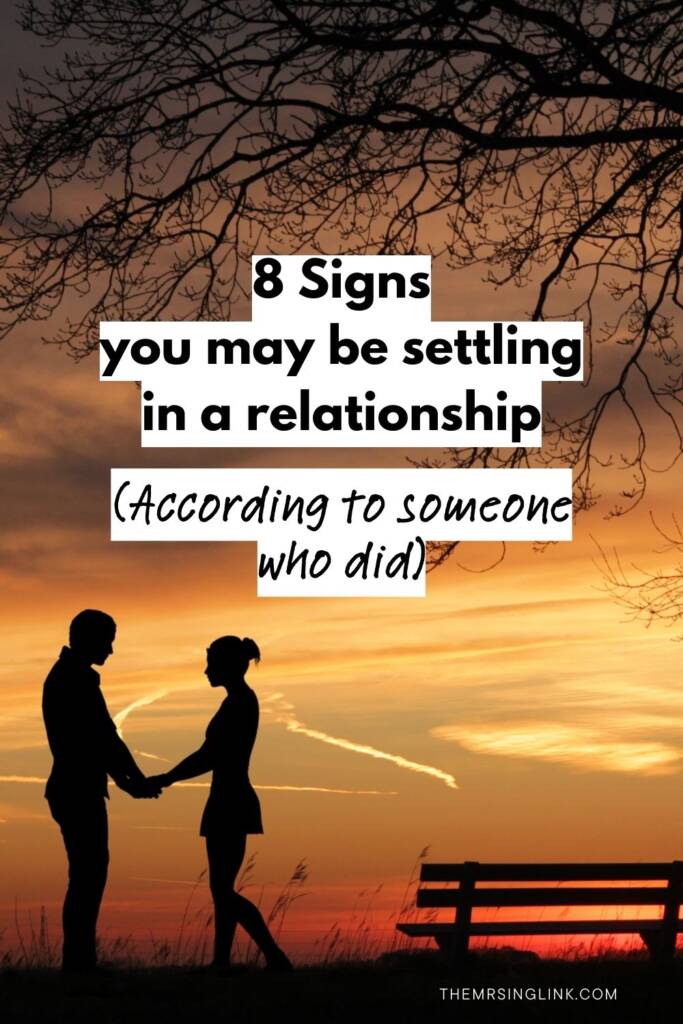
8 Signs you may be settling in a relationship, according to someone who did
You fight…and a lot
I’ll say the quiet part out loud: healthy relationships/couples don’t fight, like, ever. Is that completely realistic? No, of course not. I’m also not talking about having arguments and disagreements – every relationship will have those. There will even be times you need to decompress or process emotions separately (i.e., by taking a drive or a walk).
We already know fighting is unhealthy, yet somehow it feels like something justified by way of expressing our anger. While we are to focus on being slow to anger, there are certainly ways to express and communicate anger in a healthy manner that isn’t considered fighting…or unloving and aggressive (perceived as a threat, fight or attack).
Yet when we hear couples and individuals say, “We never fight,” we often think that’s a red flag, too. The thing is, it’s really not because of what it means by definition to fight, which is to win by any means or at whatever cost. Fighting is simply getting our way, which is more cut throat and it’s intent is to be abrasive or inflict harm (and not just physical), even in defense, which shouldn’t be perpetuated as normal or acceptable.
In terms of fighting, I experienced the emotional and psychological aspect in my previous relationship, and both of us were much to blame. Over ten years later I can look back and realize the extent to how much of that relationship I had settled for was consumed by and triggered to fighting.
In relationships, we ought to feel convicted if we’re engaging in or resorting to raising voices, name calling, directing insults, the silent treatment, retaliation, gaslighting, making threats, violating each other’s safety, boundaries and livelihood…and, well, obviously way, way worse. If you’re having to fight, or you’re fighting a lot…there is enough evidence that points to a relationship that has settled with the conditioning that it is acceptable and normal to treat one another with disdain and disrespect.
You disagree on *everything*
This one’s pretty easy, relatable and agreeable. Although, tying in with above, it can be tough to distinguish fighting from having disagreements, moreover if you disagree on everything. You know how they say when you’re a couple you’re a team and your partner is not your enemy? For many this is easier said than done.
Couples may go through times where it seems impossible to “come to terms”, compromise, or see eye to eye on anything – it’s almost like wires are crossed or rewired to operate against each other. Whatever the case, you’re not in alignment and you’re practically on separate wavelengths. You might even begin to feel it. Because of this, fuses become short and easier lit, resulting in the first point above (fighting).
This was my boat – well, our boat – as if I was constantlyyyyy patching up holes not only on my end but the other. This was EXHAUSTING, since much of our time inside the leaking boat was spent Hell-bent on being *right* and who was to blame.
I settled for this because I thought it was totally normal for couples have their “disagreements” – as I already stated. But I learned that it wasn’t about having disagreements. It was about our commitment to defiance, resulting in never-ending opposition toward one another. This felt like we were a constant threat to one another; we were literally on separate teams with no middle ground in sight, to the point it was like walking through a field of land mines. At that point the relationship no longer felt safe and inviting and connection seemed not only irreparable but repulsive, so raising our white flags meant submitting to this ever-growing empty void between us.
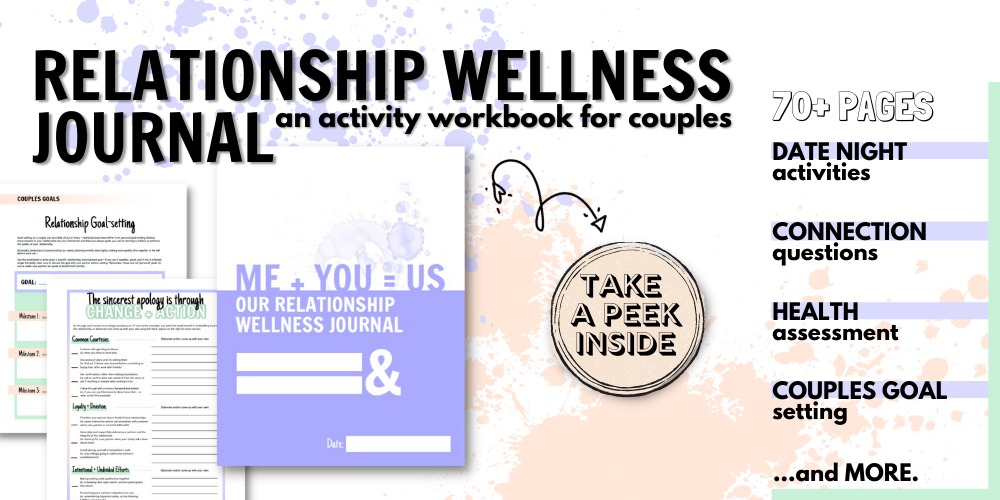
You turn a blind eye to and make excuses for negative, recurring behaviors
Sometimes I think we fail to see both sides of the coin. There’s obviously the person who does or says the wrong thing…but what about the other side to this? As in…the person who ignores, excuses, enables, or ignorantly justifies their partner’s wrongdoing. That’s equally unhealthy, and taxing.
Is that you? Are you the one turning the blind eye? Do you make excuses for your partner’s repetitive cycles of poor behavior and maltreatment? While we might think the obvious is to wish, hope, pray and even expect that our partner will suddenly change or be a perfect human being on their own (which is far from ever being true)…we do, in a way, need to guide our partner on how they can and cannot treat us.
*Reminder, this doesn’t take away from the fact that people do make mistakes, but this section applies to recurring and unyielding behaviors. For instance, your partner gets mean-drunk but refuses to see anything wrong with their habit of drinking to the point of belligerency when it not only affects them but you and the relationship. Turning a blind eye or making excuses for their destructive habit would be to offer up alcohol or justify him having his fun.
Sure, we can’t make people take accountability, BUT we can hold them accountable. Meaning, we’re taking responsibility for ourselves and what we will and will not tolerate. Sure, a nice prerequisite is a partner who is emotionally mature enough to hold themselves accountable without having to lift a finger or utter a word but let’s be real, we’re ALL bound to fall short. That’s why we do need to hold each other accountable, even when it stings.
Except, when settling in a relationship, that prerequisite can look a lot different on paper. I saw all the things that were wrong up against all the things that, in my eyes, were right (or, rather, worth overlooking). I.e., for as long they kept *bread-crumbing* me in the relationship, I continued accepting, dismissing, downplaying, and even justifying the things that were wrong.
You’re dismissing your personal boundaries
Your boundaries are for you, not as a means to control your partner…because you can’t. By setting and upholding boundaries, we are essentially hammering in a stop sign ahead of behaviors we are not willing to tolerate or entertain. It doesn’t always guarantee our stop sign will be respected – that’s the toughest fact to grasp. And because boundaries only work when either willfully respected or reinforced with followed consequences, there’s the fear of our boundaries changing how our partner feels about us and the relationship, or having to remove ourselves from them altogether.
So what do many of these individuals who struggle with boundaries (like myself) do? They dismiss, revoke or poorly uphold their personal boundaries in order to maintain a sense of peace and security in their relationships. We forget that part of setting boundaries is to establish how others can treat us in order to maintain a healthy and fair relationship for both parties.
First, we must acknowledge that our boundaries can inadvertently be received or perceived as a threat or “offense”, except that the true nature of boundaries are ultimately to maintain civility, peace and connection. Second, that if you’re dismissing your personal boundaries what you’re allowing is for your partner to [continue to] trample over your limits, personal space, well being and dignity.
When you’re settling in a relationship where boundaries are either minimized, not followed through when violated or non-existent, what’s learned is that you are to tolerate maltreatment. This can be difficult when boundaries offer only two options: 1. you depend [wait, hope] on your partner to change or 2. you follow through on your boundary with the appropriate consequence(s)…i.e., leaving the relationship.
After far too many given attempts for option 1, I finally understood what it meant to honor and follow through with my boundaries and the relationship I had settled for ultimately ended from option 2.
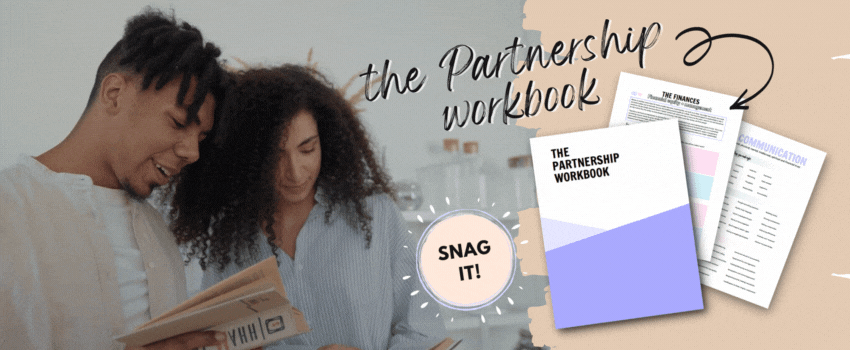
Chemistry is the one thing keeping you together, or that you’re holding onto (to stay together)
This is not saying chemistry isn’t important, it is, but it is not everything. It also shouldn’t be the stronghold keeping your relationship intact nor should it be the directional focus. You cannot build a relationship upon a foundation of sex – at least, not a healthy, authentic one. And I settled for that unstable foundation in my previous relationship, point blank.
Unfortunately, dating and relationship culture glorifies chemistry and sex as none other than the backbone to connection and compatibility. At the same time, this culture devalues the meaning of sex by perpetuating Hookup Culture, casual sex, and test driving sex as a means for relationship compatibility. I know this because I, too, participated while continuing to support *the lie*.
With that, partners are more likely to enter into, stay in and settle for unhealthy relationships based on chemistry. For example, it isn’t uncommon for someone to tolerate maltreatment for as long as the sex surpasses the hurt.
You enter into relationships quickly and on rebound
*Raises hand* Yup, I did this. My previous relationship was a rebound, merely overlapping the ending of a relationship prior to it. Nevertheless, a poor, regretful decision on my part entirely. I can own that.
When we enter into relationships quickly or go from relationship to relationship back to back, meaning we go from step one to step two in a very short, sometimes irrational span…we like to say that we wear our heart on our sleeve or that we’re following our heart (or our gut).
Now that I look back on my “youth” and the frequency in which I bounced from relationship to relationship so quickly, I wasn’t following my heart or my gut…I was following my wounds. More or less I slapped a band aid on those bad boys, took the hair of the dog and went on my way…to the next (self)-destructing relationship. My reclaimed baggage with me and all.
As much as that can be hard of hearing, we all carry baggage into our relationships to some degree or another. It’s whether or not we sift through, declutter and clean out what needs to be, but when settling in a relationship we’d rather bury it, forget about it and let the next one deal with it.
You accept unmet needs and neglecting your own needs as *the norm*
The norm is not necessarily referring to what’s popular or common practice. Sometimes we treat the norm as just the way it is. That doesn’t mean it’s acceptable, tolerable or good, either. Sometimes the norm is something slowly integrated or conditioned over time that we are blissfully unaware of or ignorant to. For instance, we learn and grow up taking on certain characteristics, behaviors, traits or habits from our family, caregivers, parents, environment, etc. A relatively common example of this would be alcoholism *running in the family*.
So if you learned early on in childhood that you had to fend for your own needs and/or felt responsible for the needs and feelings of your parents…imagine how this can be carried over through your life and in your relationships. The unfortunate consequence of this is learning that relationships mean neglecting your own needs for the sake of another’s as well as placing the responsibility of your needs into the hands of others (your partner).
*As a happily married woman I just want to reiterate that my husbands needs are important to me, just as my husband has proven and continues to prove that my needs are important to him. While sometimes relationships do require us to elevate one’s needs over the other’s, prioritizing one another’s needs without neglecting our own is still significant. This should be the norm.
Though we cannot realistically expect our partner to meet every one of our needs, it’s important to note that individuals settling in a relationship may believe their needs are too much, and that in order to feel worthy of Love they must minimize their needs and accept unmet needs. This is why those who settle in relationships often accept the bare minimum, *at best*.
You genuinely feel there isn’t *better* out there for you
Nobody on this earth is perfect. There is no perfect relationship or partner, but in this post the aim is to grasp a better understanding of what it looks like to accept the bare minimum (at best). Because, for me, when I think of settling in a relationship…that’s what comes to mind.
I, too, was convinced in the midst of a dark, troubling relationship that “This is as good as it gets,” or “I won’t find someone better..”..
..who won’t cheat, who won’t leave me high and dry, who won’t physically harm or threaten me, who won’t manipulate me, who won’t yell in my face and call me names, who won’t lie behind my back, who won’t make false promises or who doesn’t treat me like an object for their pleasure. Obviously, the list can go on.
And yet, at the same time, that mentality wasn’t like me at all, which confirms the atypical impacts unhealthy relationships can certainly have on seemingly confident individuals with some-what of a good head on their shoulders. Listen, I said no one’s perfect here, lol. Nonetheless, once I could see clearly and wipe the dirt from my hands (of that previous relationship), it was evident I settled in a relationship that diminished not only my self-confidence but my overall standards.
[Related Read: 150 Unapologetic dating standards to avoid dating DOWN]
Here’s the thing: everyone’s bare minimum looks different. I have mine, but to many others the bare minimum is simply not drawing blood. And that is a sad, sad reality – that many have been taught and conditioned to believe being in a relationship that doesn’t involve physical abuse is a luxury.
That might be an extreme (when I promise you it’s not), but the focal point here is that those who settle in relationships – at some point – are likely not even aware of how low their standards reach. When that happens, they end up believing its what they deserve. Worse off, they learn that they won’t get/find any better!
